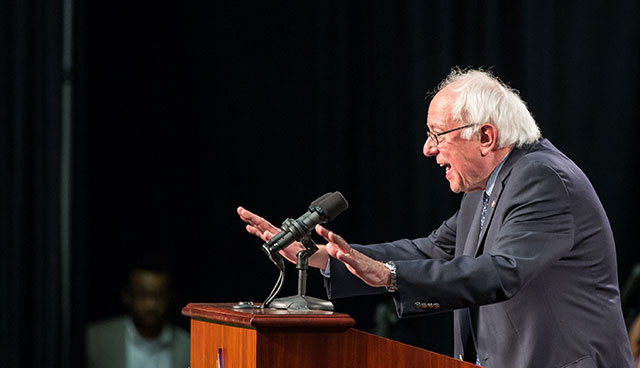
Part of the Series
Beyond the Sound Bites: Election 2016
With the Iowa caucus barely a week away, President Barack Obama is weighing in on the role of money in politics, a major platform of Democratic presidential candidate Bernie Sanders.
Obama is seriously considering taking executive action to curb the flood of money into politics by requiring corporations to disclose their political contributions.
This puts him in stark agreement with Sanders, who, at the January 17 Democratic debate, argued that money in politics is the major reason Congress cannot enact change desired by the American people.
During the health-care discussion, Sanders said:
You know what it all comes down to? Do you know why we can’t do what every other major country on earth is doing? It’s because we have a campaign finance system that is corrupt, we have super PACs, we have the pharmaceutical industry pouring hundreds of millions of dollars into campaign contributions and lobbying, and the private insurance companies as well.
Unfortunately, Bernie Sanders is absolutely right about this. Congress is inundated with money spent by very large corporations in return for political action designed to maximize corporate profits.
Pfizer, one of the largest pharmaceutical companies in the world, gave $2,217,066 in political campaign donations during the 2014 election cycle (the most recent year for which data is available), and $9,483,000 more in political lobbying. As of 2014, 40 members of Congress held stock in the pharmaceutical giant.
Congress also happens to be doing nothing to stop Pfizer from charging Americans some of the highest drug prices in the world.
Bristol-Myers Squibb is another pharmaceutical behemoth charging Americans inflated drug prices while funneling money to Congress. In 2014, the company spent $259,450 in campaign contributions, and $2,745,000 in lobbying. Twenty-five members of Congress hold stock in Bristol-Myers Squibb.
Another Big Pharma company, Johnson & Johnson, gave $757,788 in political campaign contributions in 2014, and spent $5,980,000 more in lobbying. Forty members of Congress hold stock in Johnson & Johnson.
While millions of Americans fight to afford their medications, 11 corporate leviathans (all of which donate to or lobby Congress) have wrested more than $711 billion in profits for their investors.
As members of Congress constitute some of those investors, the lax regulation that allows the American people to be extorted is actually good for the politicians in charge of representing the best interests of the people.
This throws into light the reason why, unlike any other body of legislators in the world, US federal lawmakers do not regulate or restrain massive pharmaceutical companies from engaging in predatory pricing practices.
You might say the US Congress is a bit compromised.
The same lucrative financial ties that exist between politicians and the “health-care” industry exist between politicians and for-profit prison companies, oil companies, gun companies, sugar companies, other big agribusiness and Wall Street’s bankers, advisers, and hedge fund and private equity managers.
Senate Minority Leader Harry Reid (D-Nevada) recently fought for the protection of a billion-dollar tax loophole pushed by Wall Street investors, while super PACs with close ties to Reid have received upward of $1 million from Wall Street CEOs like TPG Capital cofounder David Bonderman.
Throughout their political careers, Sen. Heidi Heitkamp (D-North Dakota), Rep. Joe L. Barton (R-Texas) and Sen. Lisa Murkowski (R-Alaska) have gotten over $3 million combined from the oil industry. Recently, these three legislators all supported the industry’s (successful) fight to lift the 40-year ban on unlimited exports of US crude oil.
In 2007, then-Sen. Hillary Clinton, now a Democratic presidential candidate, gave campaign speeches attacking a tax break for hedge fund and private equity executives, but did not put her name on Senate legislation to close the loophole. In 2006, Clinton received hundreds of thousands of dollars in direct campaign and super PAC contributions from individuals working for (and PACs representing) financial institutions such as Citigroup, Goldman Sachs, Morgan Stanley, JPMorgan Chase and Lehman Brothers.
As instance after instance shows, Congress does not, in fact, represent the people of the United States, but rich CEOs. On both sides of the aisle, campaign donations, super PACs and corporate lobbying have morphed this country into an oligarchy, controlled by the wealthy few.
As Sanders says, the issue is not that “the Republicans and Democrats hate each other. That’s a mythology from the media.”
The real problem, which Sanders has correctly identified, is that “Congress is owned by big money and refuses to do what the American people want them to do.”
Join us in defending the truth before it’s too late
The future of independent journalism is uncertain, and the consequences of losing it are too grave to ignore. To ensure Truthout remains safe, strong, and free, we need to raise $46,000 in the next 7 days. Every dollar raised goes directly toward the costs of producing news you can trust.
Please give what you can — because by supporting us with a tax-deductible donation, you’re not just preserving a source of news, you’re helping to safeguard what’s left of our democracy.